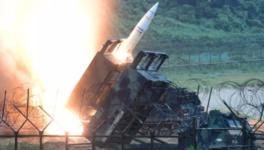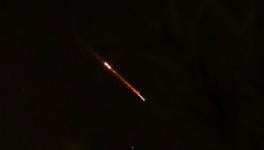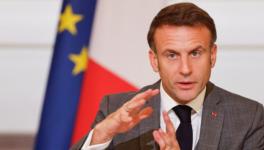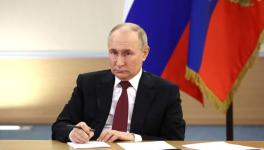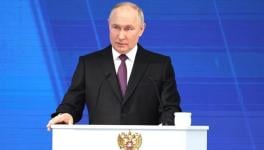Ukraine Joins NATO’s Arctic Projects Against Russia
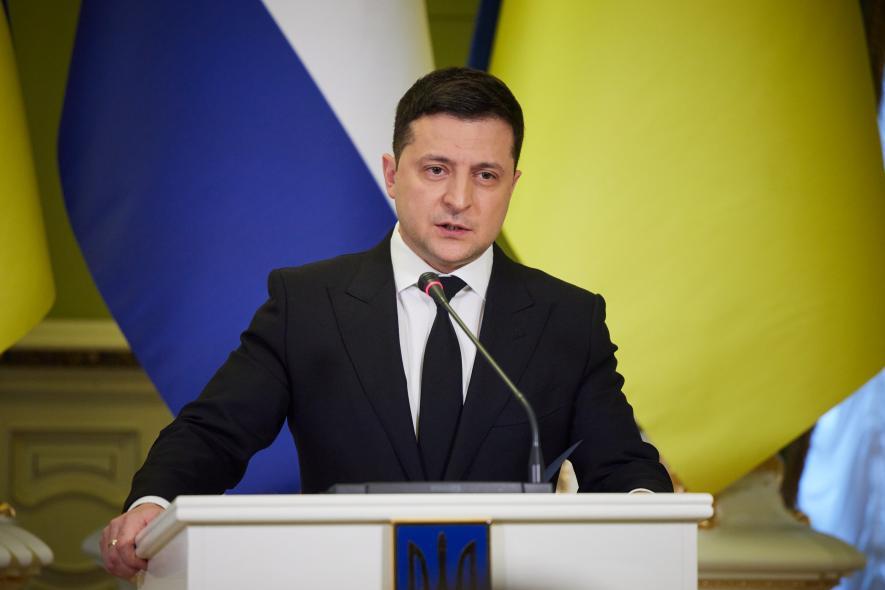
Ukrainian President Vladimir Zelensky. | Image Courtesy: Wikimedia Commons
In a plea earlier this month to Republicans not to block further military aid to Ukraine, US President Joe Biden warned that if Russia is victorious, then President Vladimir Putin will not stop and will attack a NATO country. Biden’s remark drew a sharp rebuke from Putin when he said, “This is absolutely absurd. I believe that President Biden is aware of this, this is merely a figure of speech to support his incorrect strategy against Russia.”
Putin added that Russia has no interest in fighting with NATO countries, as they “have no territorial claims against each other” and Russia does not want to “sour relations with them.” Moscow senses that a new US narrative is struggling to be born out of the debris of the old narrative on the Ukraine war.
To jog memory, on February 24, during a White House press conference on the first day of Russia’s military intervention in Ukraine, Biden said western sanctions were designed not to prevent invasion but to punish Russia after invading “so the people of Russia know what he (Putin) has brought on them. That is what this is all about.”
A month later, on March 26, Biden, speaking in Warsaw, blurted out, “For God’s sake, this man (Putin) cannot remain in power.” These and similar remarks that followed, especially from Britain, reflected a US strategy for regime change in Moscow, with Ukraine as the pivot.
This strategy dates back to the 1990s and was actually at the core of the expansion of NATO along Russia’s borders, from the Baltics to Bulgaria. The Syrian conflict and covert activities of US NGOs to foment unrest in Russia were offshoots of the strategy. At least since 2015 after the coup in Kiev, CIA was overseeing a secret intensive training programme for elite Ukrainian special operations forces and other intelligence personnel.
Succinctly put, the US set a trap for Russia to get it bogged down in a long insurgency, the presumption being the longer the Ukrainians can sustain the insurgency and keep the Russian military bogged down, the more likely is the end of the Putin regime.
The crux of the matter today is that Russia defeated the US strategy and not only seized the initiative in the war but also rubbished the sanctions regime. The dilemma in the Beltway narrows down to how to keep Russia as an external enemy so that the West’s often fractious member states will continue to rally under US leadership.
What comes to mind is a sardonic remark by Soviet Academician Georgy Arbatov who was advisor to Mikhail Gorbachev, to an elite group of senior US officials even as the curtain was coming down on the Cold War in 1987: “We are going to do a terrible thing to you -– we are going to deprive you of an enemy.”
Unless black humour in this cardinal truth is properly understood, the entire US strategy since the 1990s to rebuff the efforts of Gorbachev, Boris Yeltsin, and early Putin to establish non-adversarial relations with the West cannot be grasped.
Put differently, if the US’ post-Cold War Russia strategy has not worked, it is because of a fundamental contradiction: on the one hand, Washington needs Russia as an enemy to provide internal unity within the western alliance, while on the other hand, it also needs Russia as a cooperative, subservient junior partner in the struggle against China.
The US hopes to draw down in Ukraine and stave off defeat by leaving behind a “frozen conflict” which it’s free to revisit later at a time of its choice, but in the meanwhile, is increasingly eyeing the Arctic lately as the new theatre to entrap Russia in a quagmire.
The induction of Finland as into NATO (and Sweden to follow) means that the unfinished business of Ukraine’s membership, which Russia thwarted, can be fulfilled by other means.
After meeting Biden at the White House last Tuesday, Ukrainian President Vladimir Zelensky headed for Oslo on October 13 on a fateful visit to forge his country’s partnership in NATO projects to counter Russia in the Arctic. In Oslo, Zelensky participated in a summit of the five Nordic countries to discuss “issues of cooperation in the field of defence and security.”
The summit took place against the backdrop of the US reaching agreements with Finland and Sweden on the use of their military infrastructure by the Pentagon.
The big picture is that the US is encouraging Nordic countries to get Ukraine to participate in strengthening NATO’s Arctic borders. One may wonder what is the “additionality” that a decrepit military like Ukraine’s can bring into NATO. Herein hangs a tale.
Simply put, although Ukraine has no direct access to the Arctic, it can potentially bring in an impressive capability to undertake subversive activities inside Russian territory in a hybrid war against Russia.
In a strange coincidence, the Pentagon recently prepared the Starlink satellite system for use in the Arctic, which was used by the Ukrainian military for staging attacks on the Crimean Bridge, Russia’s Black Sea Fleet and strategic assets on Russian territory. The US’ agreement with Finland and Sweden would give the Pentagon access to a string of naval and air bases and airfields as well as training and testing grounds along the Russian border.
Several hundred thousand Ukrainian citizens are presently domiciled in the Nordic countries who are open to recruitment for “an entire army of saboteurs like the one that Germany collected during the war between Finland and the USSR in 1939-1940 on the islands of Lake Ladoga,” as a Russian military expert told Nezavisimaya Gazeta recently.
Russia’s naval chief Admiral Nikolai Evmenov also pointed out recently that “the strengthening of the military presence of the united NATO armed forces in the Arctic is already an established fact, which indicates the bloc’s transition to practical actions to form military force instruments to deter Russia in the region.”
In fact, Russia’s Northern Fleet is forming a marine brigade tasked with the fight against saboteurs to ensure the safety of the new Northern Sea Route, coastal military and industrial infrastructure in the Arctic.
Suffice to say, no matter Ukraine’s defeat in the US’ proxy war with Russia, Zelensky’s use for the US’ geo-strategy remains. From Oslo, Zelensky made an unannounced visit on December 14 to a US Army base in Germany.
Analysts who see Zelensky as a spent force had better revise their opinion — that is, unless the power struggle in Kiev exacerbates and Zelensky gets overthrown in a coup or a colour revolution, which seems improbable so long as Biden is in the White House and Hunter Biden is on trial.
The bottom line is that Biden’s new narrative demonising Russia for planning an attack on NATO can be seen from multiple angles. At the most obvious level, it aims to hustle the Congress on the pending bill for $61 billion military aid to Ukraine.
Of course, it also distracts attention from the defeat in the war. But, most importantly, the new narrative is intended to rally the US’ transatlantic allies who are increasingly disillusioned with the outcome of the war and nervous that US involvement in Europe may dwindle as it turns to the Indo-Pacific.
When Putin reacts harshly that Biden’s new narrative is “absurd”, he is absolutely right insofar as Russia’s focus is on things far more important than waging a senseless continental war in Europe. After all, it was one of the founding fathers of the US, James Monroe who said that a king without power is an absurdity.
MK Bhadrakumar is a former diplomat. He was India’s ambassador to Uzbekistan and Turkey. The views are personal.
Get the latest reports & analysis with people's perspective on Protests, movements & deep analytical videos, discussions of the current affairs in your Telegram app. Subscribe to NewsClick's Telegram channel & get Real-Time updates on stories, as they get published on our website.









